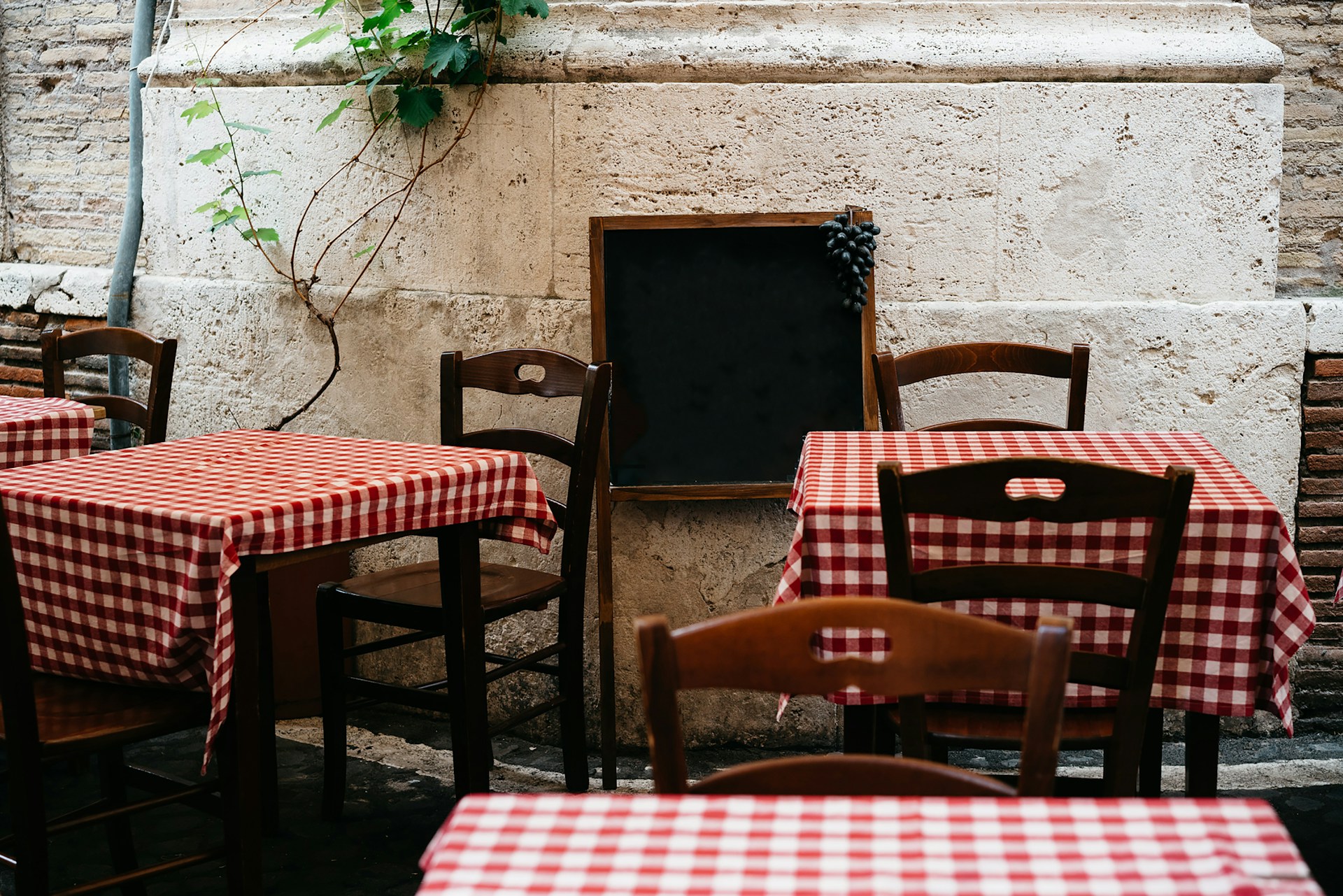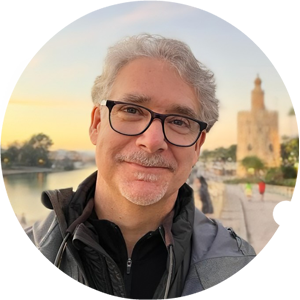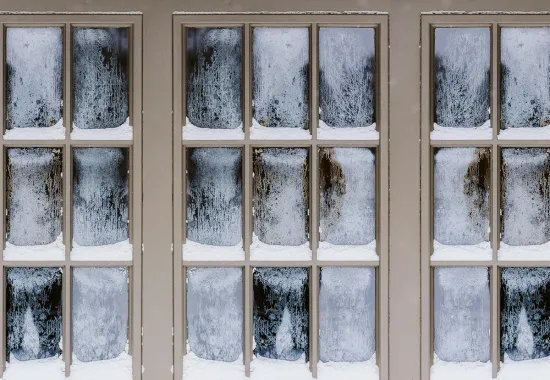The Old Man in the Café
The day was warm, the sun past its meridian, and the sky was deep and blue and cloudless and there was no one in the courtyard save for the old man and a young couple in the shade beneath the trees furthest from street. In the evening, the café and terrace would be full of revelers, a tension and a droning of voices and drums in the air. The rocket that would announce the beginning of San Fermin would go up in the square at noon the next day, and the street beyond the walls that enclosed the courtyard would be teeming with people and the balconies around the square would be packed with those looking at the undulating, chanting throng below. The musicians in red berets and the guards in blue berets encircling them would be wholly engulfed, the dancers in white and red a living mass swaying this way and that, arms aloft, pushing in at the guards and musicians.
The old man was thin, even gaunt, but he was well-dressed and quiet and he was no bother to anyone, least of all the two waiters who were bored and listless in the heat and who wanted to go to their homes for the siesta before the tumult of the night.
On his table were two or three newspapers and he had another open before him. Now and then he would reach for his coffee. A small glass of brandy, untouched, sat in a saucer and he seemed to have forgotten about it. It was the same every day. He would take one of the tables near the fountain that sat in the center of the courtyard and he would order some bread and a coffee and a brandy and he would push the brandy and saucer to the far side of the small table and leave it be.
The young waiter had finished sweeping the courtyard and he had ignored the young couple, who did not notice him anyway, each leaning toward the other, murmuring, laughing, and he had returned to where the older waiter sat. He dropped into a chair, blasted by the heat and the stillness of the air.
He gestured at the old man.
“Why does the old man order a brandy every day and not drink it.”
The older waiter shrugged. “I have no idea.”
They sat for a time, saying nothing, the young waiter listening to the bustle beyond the walls, the older waiter vacant and as if pushed into his chair by the sun.
“Didn’t the old man used to be famous?”
“Someone said that once. Montoya, the man who owned the hotel long ago, told me that. I remember that he did not like the American.”
“What was he famous for?”
The older waiter shook his head. “As I recall, Montoya said that he wrote a book about the bullfights, about a young bullfighter from Barcelona who was supposed to be the next Belmonte but who had one good season and then was no good after that.”
The young waiter nodded. “Who was Belmonte?”
The older waiter smiled. “You young people make me weary.”
“I think being old makes you weary.”
They laughed and as they looked over at the old man, the old man suddenly swayed on his chair, as if he would list and then fall to the paving stones. With one hand he gripped the edge of the table and with the other he set the newspaper down, covering his coffee and bread. He rocked in place once or twice, both hands now gripping the table and at last seemed to steady himself. He pushed his chair away, shoulders rounded, his hands folded in his lap.
The waiters watched and after a few moments the older waiter approached the table.
“Can I get you another coffee, sir, or perhaps some water?”
The old man seemed startled to find the waiter standing near to him.
“What now?”
“Can I get you anything, sir? A water or a bit of wine? Perhaps a bit of food?”
The old man looked up at the waiter.
“No. I am fine. Thank you.”
“No problem. We like to make sure that all is well. That you are well.”
The old man smiled and looked at the paper on the table in front of him. He tapped on one of the columns. “You see, I am at an age, now.”
He looked from the waiter back to the newspaper. “Someone I used to know, a long time ago. You lose track, sometimes.”
The waiter nodded as the old man rose to his feet. He swayed unsteadily, as if a boxer who had endured a beating, and asked how much he owed. “No problem, my friend. This will be on me.”
The American smiled again and shook his head. He drew a wallet from inside his blazer and set more than enough peseta on the table. “I have always liked this place, and I am always glad to sit beneath the trees and listen to the fountain and feel the sun.” With that, he turned and staggered among the tables toward the archway leading to the street. The young couple did not notice as he passed.
The waiter looked at the paper for a moment and then sat where the old man had sat and he called to the younger waiter to bring him some brandy and some water. He picked up the paper and looked where the old man had pointed. The younger waiter brought him his drink and he sipped it as he looked over the notice.
It is with great sadness that we announce the passing of Benjamin James Field of Chicago, Illinois, on May 3, 1963. Benjamin was born on September 22, 1896, in Evanston, IL, to James Patrick and Grace (Nee Sersale) Field.
A dedicated family man and philanthropist, he was well-known in the Midwest and beyond for his good works, including dedicating a cancer research center at Northwestern University Hospital. For most of the summer, he could be found sailing on Lake Michigan or on the Atlantic near the family’s retreat in Kennebunkport.
He is survived by his children Patrick Field and his wife Charlotte and their children Sam and Colin, Twombly Field and his wife Janet and their children Samantha, Susan, and Raymond, and Cassandra Duplessis and her husband Mark and their children Joshua and Mina.
He is preceded in death by his grandparents Horace and Catherine Field and Anthony and Gabrielle Sersale, by his parents James and Grace, and by his wife, Brett (Smythe) and her son Alexander Campbell.
Setting the paper down, he crossed back to the where he had been sitting with the young waiter.
“So, what was it? Did the old man have a stroke? Was the sun suddenly too much for him?
“No, I think someone died. My English is not good, certainly to read, but perhaps he learned that one of his rich friends had died?”
“Sad.”
“Is it sad when a rich person dies?”
The young waiter looked at the older man. “Well, I have good news. I have chased away the young couple and so we can lock the gate. I am heading home for a siesta, and I will see you back here tonight for the madness.”
From the relative quiet of the courtyard, they emerged into the pell-mell of the street, people rushing along toward the avenue and the square, a certain agitation in their resolve.
As the young waiter, grinning, joined the press, the older waiter stood and looked up and down the street. It was congested with tourists and people in from the country or the cities and all seemed on the edge of a sort of chaos. He did not like the commotion and he walked slowly, head down, as close as he could get to the buildings and as far away from the others on the sidewalks. He did not want to go home, he would not sleep or rest, but would be restless and his tiny apartment would be stuffy and the young people who lived next to him, if they were not out, would be playing their radio, these days always, it seemed, the group from England who wanted everyone to love and please them.
Missing the quiet of the courtyard and the stately rise of the hotel behind it, he stepped into a taberna that was merely crowded, and navigated his way to the bar.
“What’s yours?” asked the barman.
“A brandy and water. A small one.”
In a moment, he had finished it, and the barman asked if he wanted another.
He shook his head. All at once, he had a headache.
So, the old man, the American, had lost a friend? The waiter could sympathize. Only a few weeks ago, someone had told him that one of his oldest friends, someone he had lost track of in the way that people do, had died in their hometown, a heart attack, and the news had been a bit of a jolt. He wasn’t as old as the American, but he too was getting to that age, the age where the people you have been knowing abruptly or over the course of a long and painful time pass away. This was life, as natural a thing as one could imagine, but upsetting nonetheless. Returning to the street, he debated whether he would stop at the next bar he crossed and have another brandy to see if that would push away his headache, but he decided against it and began the long trek to his apartment.
Recommended
The Monstera
The Wild Women of Brigantine
The Salamander






